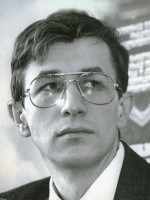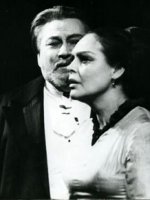Boris Babochkin is a Actor Russe born on 17 january 1904 at Saratov (Russie)
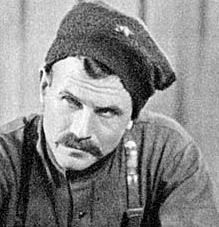
Boris Andreyevich Babochkin (Russian: Бори́с Андре́евич Ба́бочкин; 18 January 1904 – 17 July 1975) was a well-known Soviet film and theatre actor and director. Boris Babochkin was one of the first internationally recognized stars of the Soviet-Russian cinema. He rose to fame with the title role in the classic film Chapaev (1934) and later, in the 1950s, he played a sharp anti-communist character on stage in Moscow, for which he was censored by the Soviet Communist Party.
Babochkin was born on 18 January 1904, in Saratov on the Volga river in Russia. His father, Andrei Babochkin, came from a family of Russian merchants and traders. The father had owned a successful trade business in the city of Saratov on Volga, then sold his business and worked for a railroad. The Babochkins lived in Krasny Kut, a small station near Saratov. His mother, a school teacher, was fond of Russian classical literature, and young Babochkin was brought up in an intellectually stimulating environment. Young Boris Babochkin and his brother were fond of acting and were involved in amateur theatre productions in Saratov. At age 14 Boris joined the Red Army and served for one year in the same front on Volga and the Urals with the legendary commander Chapayev, whom he would later portray, although they never met.
Early career
In 1920 Babochkin entered a local drama school in Saratov, but he soon dropped out and moved to Moscow to pursue an acting career. At first he enrolled in the well-known drama school of Michael Chekhov affiliated with the Moscow Art Theatre. There Babochkin studied with Michael Chekhov for a few months. He admired Chekhov, but eventually their personalities clashed. In 1921, he left Chekhov's school to join "Molodye Mastera" studio, under Illarion Pevtsov, a well-connected figure in Soviet film and theatre. There, with his elder brother Vitaly Babochkin, Boris worked his first professional season on stage. In the following six years he played seasonal gigs on stage with various troupes in Moscow and Saratov, then in Samarkand and Bishkek in Central Asia, and then in Voronezh, Mogilev in Belarus, and Berdichev in Ukraine.
Leningrad
From 1927 to 1940 Babochkin lived and worked in Leningrad. He married a young ballerina, Ekaterina Georgieva, and they became involved in the city's cultural life. Babochkin continued his studies of theatre and film, and made his film acting debut at Lenfilm Studio in 1927. In 1934 he played the leading role in Chapaev, a classic film that brought him global fame and local jealousy. During the 1930s he played leading roles at the Leningrad State Puskin Drama Theater and at the Bolshoi Drama Theater under director Aleksei Dikiy. In 1937, when Dikiy was arrested and imprisoned in the Gulag camps, Babochkin was hurt and suffered an emotional crisis. However, he survived the first wave of Stalin's Great Purge. In 1937 Babochkin stepped in as artistic director of the Bolshoi Drama Theater (BDT) in Leningrad and worked in that position until 1940.
Moscow
In 1940 Babochkin was summoned by the Soviet leadership and moved back to Moscow, a move that he later described as the biggest mistake in his life. During World War II he made several trips to Leningrad, besieged by the Nazis, where he supported the defenders of Leningrad under the Siege and helped lift their spirits with his performances, while they were struggling to survive. After the war he started a teaching career at the Moscow State Film Institute (VGIK). In 1952 Babochkin became artistic director of the Moscow Drama Theater named after Pushkin. There he invited his old director Aleksei Dikiy to direct Shadows, a play by Saltykov-Shchedrin. In Shadows Babochkin played one of his best roles ever — Klaverov, a corrupt career politician, resembling a typical Soviet bureaucrat. For this role Babochkin was viciously attacked in the main Soviet newspaper Pravda. His critic was none other than Ekaterina Furtseva, who was then Mayor of Moscow and later was made Minister of Culture of the Soviet Union and who eventually committed suicide.
Furtseva used all her official power to destroy Babochkin. She banned the play and restricted the world famous actor, known as Chapayev, from public performances. Furtseva personally ordered that all film studios and drama companies of the USSR should refuse him any jobs, keeping him practically unemployed for three years until he was finally forced to apologize to the Communist Party. Official Soviet censorship, which was under the control of Furtseva, spared no effort in taming the famous actor and manipulating his star power. After that, Babochkin's acting career was restricted to playing only positive, boring, exemplary Soviet characters.
Later career
Babochkin's acting career was suppressed until the death of his high-ranking Communist opponent Furtseva. The rare exception was his last role in Begstvo mistera Mak-Kinli (1975) for which he was awarded the State Prize of the USSR. From 1955 until his death in 1975, Babochkin was a permanent member of the troupe at the Maly Theatre in Moscow. From 1946 to 1975 he also taught an acting class at State Film Institute (VGIK), where he became a professor in 1966. In his acting career spanning over 55 years, Babochkin played over 200 roles on stage and 25 roles in movies and on television, but his role as Chapayev in the eponymous 1934 film remained the unsurpassed highlight of his film career.
Source : Wikidata
Boris Babochkin

Birth name Baris Andreyevich Babochkin
Nationality Russie
Birth 17 january 1904 at Saratov (Russie)
Death 17 july 1975 (at 71 years) at Moscow (Russie)
Awards People's Artist of the USSR, Order of Lenin, USSR State Prize, State Stalin Prize, Medal "For the Victory over Germany in the Great Patriotic War 1941–1945"
Nationality Russie
Birth 17 january 1904 at Saratov (Russie)
Death 17 july 1975 (at 71 years) at Moscow (Russie)
Awards People's Artist of the USSR, Order of Lenin, USSR State Prize, State Stalin Prize, Medal "For the Victory over Germany in the Great Patriotic War 1941–1945"
Biography
Life on the VolgaBabochkin was born on 18 January 1904, in Saratov on the Volga river in Russia. His father, Andrei Babochkin, came from a family of Russian merchants and traders. The father had owned a successful trade business in the city of Saratov on Volga, then sold his business and worked for a railroad. The Babochkins lived in Krasny Kut, a small station near Saratov. His mother, a school teacher, was fond of Russian classical literature, and young Babochkin was brought up in an intellectually stimulating environment. Young Boris Babochkin and his brother were fond of acting and were involved in amateur theatre productions in Saratov. At age 14 Boris joined the Red Army and served for one year in the same front on Volga and the Urals with the legendary commander Chapayev, whom he would later portray, although they never met.
Early career
In 1920 Babochkin entered a local drama school in Saratov, but he soon dropped out and moved to Moscow to pursue an acting career. At first he enrolled in the well-known drama school of Michael Chekhov affiliated with the Moscow Art Theatre. There Babochkin studied with Michael Chekhov for a few months. He admired Chekhov, but eventually their personalities clashed. In 1921, he left Chekhov's school to join "Molodye Mastera" studio, under Illarion Pevtsov, a well-connected figure in Soviet film and theatre. There, with his elder brother Vitaly Babochkin, Boris worked his first professional season on stage. In the following six years he played seasonal gigs on stage with various troupes in Moscow and Saratov, then in Samarkand and Bishkek in Central Asia, and then in Voronezh, Mogilev in Belarus, and Berdichev in Ukraine.
Leningrad
From 1927 to 1940 Babochkin lived and worked in Leningrad. He married a young ballerina, Ekaterina Georgieva, and they became involved in the city's cultural life. Babochkin continued his studies of theatre and film, and made his film acting debut at Lenfilm Studio in 1927. In 1934 he played the leading role in Chapaev, a classic film that brought him global fame and local jealousy. During the 1930s he played leading roles at the Leningrad State Puskin Drama Theater and at the Bolshoi Drama Theater under director Aleksei Dikiy. In 1937, when Dikiy was arrested and imprisoned in the Gulag camps, Babochkin was hurt and suffered an emotional crisis. However, he survived the first wave of Stalin's Great Purge. In 1937 Babochkin stepped in as artistic director of the Bolshoi Drama Theater (BDT) in Leningrad and worked in that position until 1940.
Moscow
In 1940 Babochkin was summoned by the Soviet leadership and moved back to Moscow, a move that he later described as the biggest mistake in his life. During World War II he made several trips to Leningrad, besieged by the Nazis, where he supported the defenders of Leningrad under the Siege and helped lift their spirits with his performances, while they were struggling to survive. After the war he started a teaching career at the Moscow State Film Institute (VGIK). In 1952 Babochkin became artistic director of the Moscow Drama Theater named after Pushkin. There he invited his old director Aleksei Dikiy to direct Shadows, a play by Saltykov-Shchedrin. In Shadows Babochkin played one of his best roles ever — Klaverov, a corrupt career politician, resembling a typical Soviet bureaucrat. For this role Babochkin was viciously attacked in the main Soviet newspaper Pravda. His critic was none other than Ekaterina Furtseva, who was then Mayor of Moscow and later was made Minister of Culture of the Soviet Union and who eventually committed suicide.
Furtseva used all her official power to destroy Babochkin. She banned the play and restricted the world famous actor, known as Chapayev, from public performances. Furtseva personally ordered that all film studios and drama companies of the USSR should refuse him any jobs, keeping him practically unemployed for three years until he was finally forced to apologize to the Communist Party. Official Soviet censorship, which was under the control of Furtseva, spared no effort in taming the famous actor and manipulating his star power. After that, Babochkin's acting career was restricted to playing only positive, boring, exemplary Soviet characters.
Later career
Babochkin's acting career was suppressed until the death of his high-ranking Communist opponent Furtseva. The rare exception was his last role in Begstvo mistera Mak-Kinli (1975) for which he was awarded the State Prize of the USSR. From 1955 until his death in 1975, Babochkin was a permanent member of the troupe at the Maly Theatre in Moscow. From 1946 to 1975 he also taught an acting class at State Film Institute (VGIK), where he became a professor in 1966. In his acting career spanning over 55 years, Babochkin played over 200 roles on stage and 25 roles in movies and on television, but his role as Chapayev in the eponymous 1934 film remained the unsurpassed highlight of his film career.
Usually with
Filmography of Boris Babochkin (4 films)
Actor
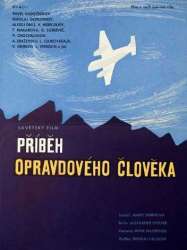
Story of a Real Man (1948)
, 1h31Directed by Aleksandr Borisovich Stolper
Origin Russie
Genres Drama, War
Themes Transport films, Aviation films
Actors Pavel Kadotchnikov, Aleksei Dikij, Vasili Merkuryev, Lyubov Sokolova, Boris Babochkin, Serge Bondartchouk
Roles commandant
Rating68%






Friends (1939)
Directed by Viktor Eisymont, Leo Arnchtam
Genres Drama, War, Biography, Historical
Themes Political films
Actors Boris Babochkin, Nikolai Cherkasov, Stepan Kayukov, Aleksandr Borisov
Roles Алексей
Rating62%





The film is based on the life of Sergey Kirov. During the Russian Civil War, the Communist Party of the Soviet Union sends Aleksey to Caucasus Mountains to help organize an armed uprising.

The Girlfriends (1936)
, 1h35Directed by Leo Arnchtam
Genres Drama, War
Themes Politique, Political films
Actors Ianina Boleslavovna Jeïmo, Zoya Fyodorova, Boris Chirkov, Boris Babochkin, Maria Blumenthal-Tamarina, Nikolai Cherkasov
Roles Andrei
Rating66%





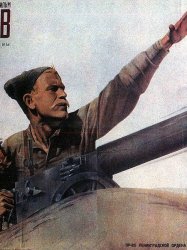
Chapayev (1934)
, 1h33Directed by Georgi Vasilyev, Sergei Vasilyev, Frères Vassiliev
Origin Russie
Genres Drama, War, Comedy, Adventure, Historical
Themes Politique, Political films
Actors Boris Babochkin, Boris Chirkov, Varvara Miasnikova, Sergei Vasilyev, Stepan Krylov, Georgi Vasilyev
Roles Chapayev
Rating69%





Le protagoniste est Vassili Ivanovitch Tchapaïev, un commandant bolchévique de la Guerre civile russe. Le scénario est basé sur le livre éponyme de Dmitri Fourmanov. Fourmanov en réalité était commissaire politique de la division commandée par Tchapaïev. Son livre est néanmoins romancé et non pas simplement documentaire. Dans le film, Fourmanov apparaît en personne comme un des personnages principaux. L'image épique de Tchapaïev créée par Boris Babotchkine est celle d'un homme sans instruction, avec peu de conscience politique affirmée, mais qui comprit instinctivement les buts des Bolchéviks et l'art de la guerre révolutionnaire. (Le Tchapaïev historique était un homme plus complexe). Dans une scène célèbre, le commandant explique à un de ses subordonnés une attaque contre les Blancs en utilisant des pommes de terre qui symbolisaient tel ou tel groupe militaire. Parmi les personnages principaux, on trouve Petka, jeune aide-de-camp de Tchapaïev, et une jeune fille, Anka, qui est responsable de la mitrailleuse. Dans la scène finale, Tchapaïev se noie dans le fleuve Oural.
 Connection
Connection

